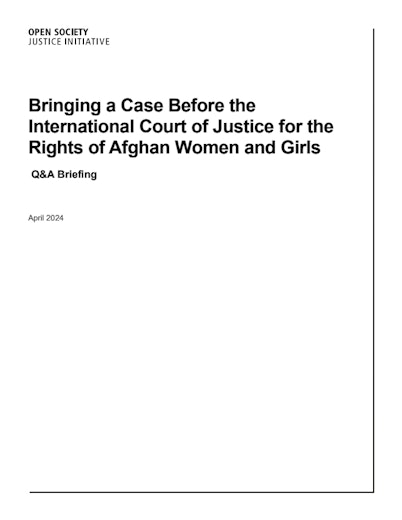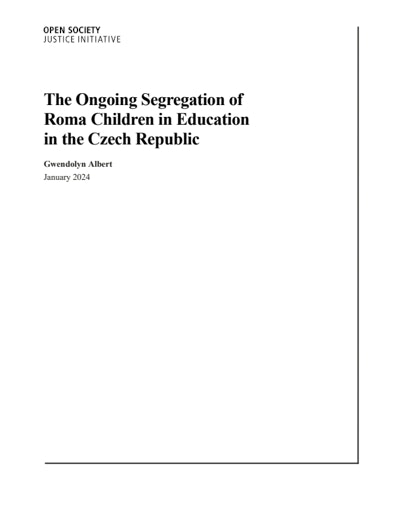German Headscarves Ban
Headscarves Ban for Muslim Teachers
In 2006 several regional governments in Germany adopted laws banning teachers from wearing religious clothing or from making any ideological manifestations, supposedly to maintain neutrality and peace in the school. However, Christian and "Western" religions are explicitly exempted from the ban. This amounts to discrimination against Muslim teachers on grounds of religion, but also disproportionately affects women from ethnic minorities. The German Constitutional Court found that a blanket ban on religious expression based on the outward appearance of educators was incompatible with religious freedom.
Facts
On 13 June 2006, the Regional State (Bundesland) of North-Rhine Westphalia passed a law amending the School Act of 2005. The amendment came into force on June 29, 2006. The new provisions of the law, commonly known as the “neutrality rule,” prohibit teachers from engaging in “political, religious, ideological or similar manifestations that may endanger or disturb the neutrality of the Land of NRW towards pupils or parents or the political, religious or ideological peace of the school.”
However, the law expressly exempts from this ban the “exhibition of Christian and occidental educational and cultural values or traditions.” In Germany this amendment is generally known as the “headscarf ban” law.
As a result of the law, several Muslim female teachers were prohibited from wearing their headscarves to school, and were at risk of reprimands, suspension and even dismissal. Some of them challenged the ban before German domestic courts, and two of the cases were eventually brought before the German Constitutional Court.
Open Society Justice Initiative Involvement
The Justice Initiative submitted observations to the Constitutional Court arguing that the selective ban violates European Union equality legislation as well as the prohibition on discrimination under the European Convention on Human Rights.
Arguments
European Union Law. The rule which bans religious clothing whilst protecting Christian religious clothing amounts to religious and gender discrimination in employment, contrary to both the EU Framework Directive, the EU Gender Equality Directive, as well as indirectly the EU Racial Equality Directive. The question of whether the ban is a permitted exception under EU law should be referred to the Court of Justice of the European Union in Luxembourg for a clear statement of the permissible exceptions to gender and religious discrimination.
European Convention on Human Rights. The ban which affects visible signs of Islam while permitting visible signs of Christianity and other occidental religions amounts to an unjustified difference in treatment violating Article 14 of the European Convention on Human Rights (ECHR) taken with the right to religion under Article 9 ECHR. There must be concrete evidence to objectively justify the different treatment. The Constitutional Court is invited interpret the German Basic Law in a manner that is open to international law.
In March 2015, the German Constitutional Court overturned the ban. The court ruled that to justify a ban, schools must show a sufficiently specific risk to school neutrality emanating from the person wearing a religious symbol, e.g. by the teacher’s verbal expressions or other pressure by which they proselytized their religion. An abstract risk was not sufficient. The court found that a "blanket ban on religious expression based on the outward appearance of educators" is incompatible with the right to religious freedom.
The Court also explicitly ruled that the provision in the NRW school law which exempted Christian and Western religious symbols from the ban was discriminatory. The court rejected the government’s justification that these religions were permissible because they represented acceptable Western values and culture to the detriment of other religions.
Judgment of the Constitutional Court.
Justice Initiatives files its observations to the Constitutional Court.
The Constitutional Court requests all German Regional States to comment on the cases and express their position and practice on this issue in their respective jurisdictions.
Several cases are filed before labor courts by female Muslim teachers affected by the ban. Two anonymized cases with numbers 1 BvR 471/10 and 1 BvR 1181/10 are brought before the German Constitutional Court.
North-Rhine Westphalia adopts an amendment to the School law prohibiting teachers from engaging in “political, religious, ideological or similar manifestations that may endanger or disturb the neutrality and peace in the school.”
Related Cases
Related Work
Q&A: Bringing a Case Before the International Court of Justice for the Rights of Afghan Women and Girls
This paper considers 21 questions around the feasibility of bringing a complaint at the International Court of Justice against Afghanistan's Taliban for egregious and prevalent violations of women’s and girls’ rights.

The Ongoing Segregation of Roma Children in the Czech Republic
This report, presented to the European Commission in January 2024, presents new evidence indicating that the Czech Republic's discriminatory treatment of Roma children is in breach of the European Union's Racial Equality Directive.

A Legal Victory in the Drive to End Racist Police Tactics Ethnic Profiling
Mohamad Wa Baile, a Swiss citizen, complained to the European Court of Human Rights that he had been subjected to a discriminatory stop by police in Switzerland. The court ruled in his favor, marking a step forward in the drive to eliminate racially-biased policing in Europe.
